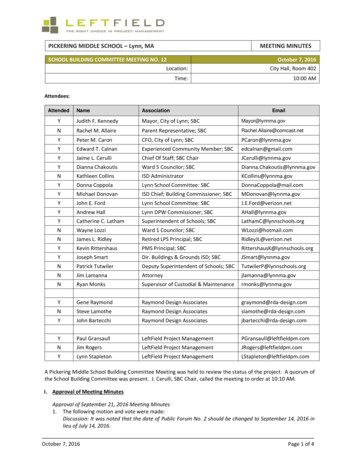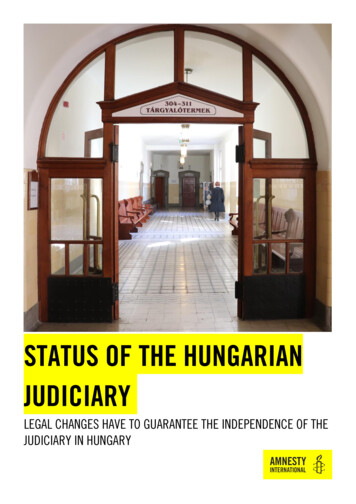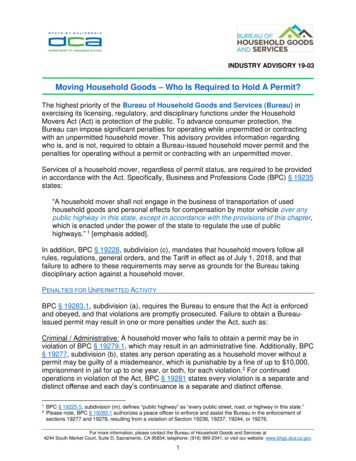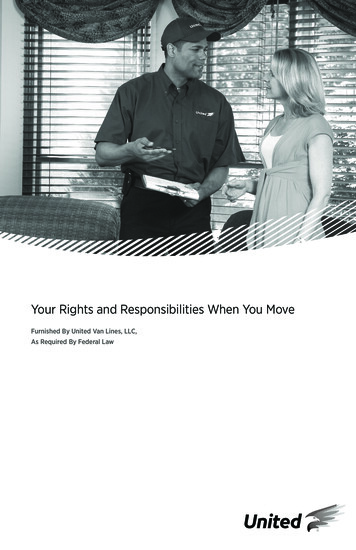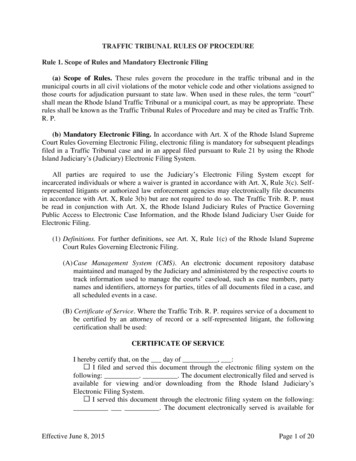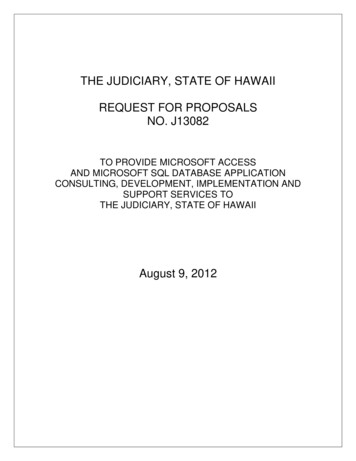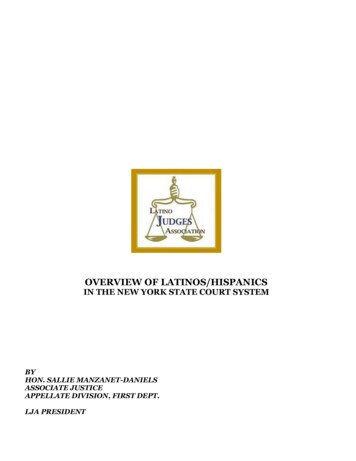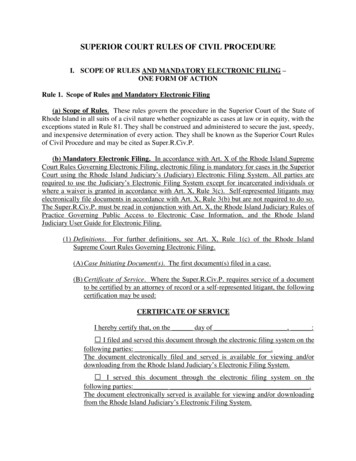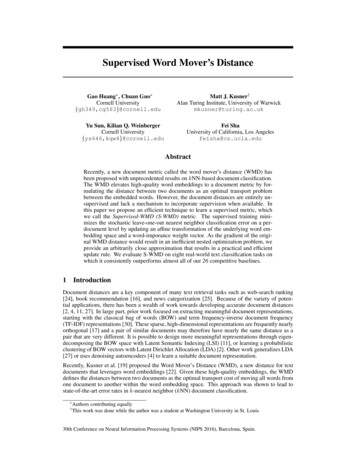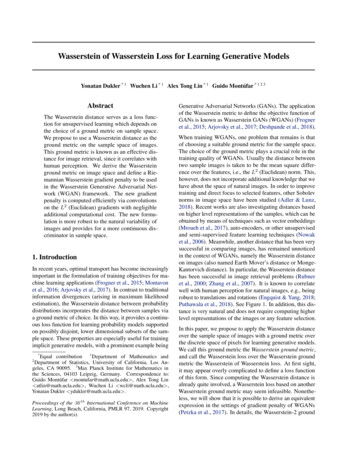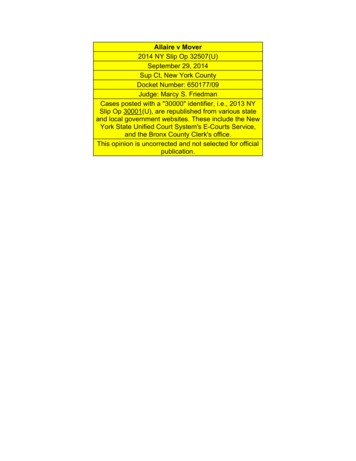
Transcription
Allaire v Mover2014 NY Slip Op 32507(U)September 29, 2014Sup Ct, New York CountyDocket Number: 650177/09Judge: Marcy S. FriedmanCases posted with a "30000" identifier, i.e., 2013 NYSlip Op 30001(U), are republished from various stateand local government websites. These include the NewYork State Unified Court System's E-Courts Service,and the Bronx County Clerk's office.This opinion is uncorrected and not selected for officialpublication.
[* 1]SUPREME COURT OF THE STA TE OF NEW YORKCOUNTY OF NEW YORK: PART --------------------)(RONALD ALLAIRE,Plaintiff,Index No. 650177109-againstJONATHAN MOVER, individually, andRECKLESS MUSIC LLC, d/b/a SKYLINESTUDIOS, d/b/a SOSO MUSIC, a/k/aSKYLINE STUDIOS NYC and CDZ RECORDS ----------------------------------)(Marcy Friedman, J.:In this action to recover a share in an alleged partnership to run a recording studio,defendants Jonathan Mover (Mover), Reckless Music LLC (Reckless), d/b/a Skyline Studiosd/b/a SoSo Music, a/k/a Skyline Studios NYC, and CDZ Records LLC move, pursuant to CPLR3212, for summary judgment dismissing the complaint. Plaintiff Ronald Allaire appears pro sein opposition to the motion.The complaint alleges that on or about July 1, 2000, plaintiff and Mover entered into a"partnership agreement," under which Mover would hold a 65% equity share, and plaintiffwould provide services and equipment to defendants in exchange for a 35% equity share in"Skyline." (Comp!., ii 8.) The complaint defines Skyline as all of the defendants collectively.(Comp!., opening paragraph.) The complaint further alleges that Mover has "failed to providePlaintiff Allaire of[ sic] his net share of the income from Skyline and promisedequity/ownership" (id., ii 13), and has "transferred, assigned, and diverted to himself, assets,property and business opportunities of Skyline." (Id.,ii 14.)
[* 2]The first cause of action of the complaint seeks, among other things, plaintiffs share ofprofits, an accounting, and dissolution of the partnership. The second cause and third causes ofaction plead claims for breach of contract and breach of fiduciary duty, respectively, based onthe s me factual allegations. The fourth cause of action alleges that plaintiff provided defendantswith goods and services, including equipment, labor, and goodwill, and seeks damages for suchgoods and services in the amount of 750,000. The fifth and sixth causes of action plead claimsfor tortious interference with contract and tortious interference with prospective businessrelations, respectively. The seventh cause of action pleads fraud. The eighth c use of actionpleads unjust enrichment. The ninth cause of action seeks an injunction directing defendants toreturn equipment to plaintiff that plaintiff allegedly provided to defendants but that remained hisproperty.The relevant undisputed facts are as follows: Prior to I 999, nonparty John King was theoperator of a recording studio, under the name Chung King House of Metal. Plaintiff RonaldAllaire was employed by King as an independent contractor engineer. At that time, Mover wasin"volved in running another recording studio. In 2000, King and Mover began to discussrunning a studio together. King entered into a lease for the studio premises, dated July 21, 2000(Mover Aff., Ex.A), in his capacity as president of 36 W 37 St. Partners, LLC. Mover and Kingsubsequently signed an agreement, dated January 26, 2001 (2001 Agreement, Mover Aff., Ex.B), to "set forth the material terms governing our participation in Skyline Studios NYC, LLC,"an LLC that was to be formed to operate the new recording studio. The 2001 Agreement wassigned only by Mover and King, but provided: "John King shall hold fifty-five percent (55%) ofthe controlling interest in the Company. Jonathan Mover shall hold thirty-five percent (35%) of2
[* 3]the controlling interest in the Company. Ronald Allaire shall hold ten percent (10%) of thecontrolling interest in the Company. The purpose of the Company is . to operate a recordingstudio located at 36 West 37th Street . under the name 'Skyline Studios."' Skyline StudiosNYC, LLC was never formed. King failed to make payments under the lease, and the limitedliability corporation formed to hold the lease was evicted in February 2002. In 2002, Moverincorporated Reckless Music LLC (Reckless) to operate the studio without any continuinginvolvement by King, and negotiated a new lease (Mover Aff., Ex. C) in Reckless' name for theremaining eight years of the initial lease term.It is undisputed that commencing in 2000, from the outset of King's business dealingswith Mover, Allaire worked at the studio, constructing and wiring it. (Mover Aff., iJ 10.) It isalso undisputed that Allaire worked with Mover at the studio from 2002, when Moverincorporated Reckless, until 2009, when Mover allegedly fired Allaire for using pirated software.The parties sharply dispute whether Allaire was an independent contractor - Mover's position or a partner or other business associate - Allaire's position.The standards for summary judgment are well settled. The movant must tender evidence,by proof in admissible form, to establish the cause of action "sufficiently to warrant the court asa matter of law in directing judgment." (CPLR 3212lb]; Zuckerman v City of New York, 49NY2d 557, 562 [1980].) "Failure to make such showing requires denial of the motion, regardlessof the sufficiency of the opposing papers." (Winegrad v New York Univ. Med. Ctr., 64 NY2d851, 853 [1985].) Once such proof has been offered, to defeat summary judgment "the opposingparty must 'show facts sufficient to require a trial of any issue of fact' (CPLR 3212, subd. [b]."(Zuckerman, 49 NY2d at 562.)3
[* 4]It is further settled that "in determining whether parties forged . an oral partnershipagreement, a court will consider the intent of the parties, whether the parties shared joint controlin the management of the business, whether the parties shared profits and losses and theexistence of capital contribution." (Moses v Savedoff, 96 AD3d 466, 470 [1st Dept 2012].) '"[l]tis axiomatic that the essential elements of a partnership must include an agreement between theprincipals to share losses as well as profits."' (Id., quoting Chanler v Roberts, 200 AD2d 489,491 [1st Dept 1994 ], Iv dismissed in part, denied in part 84 NY2d 903.)Although the complaint alleges that an oral partnership agreement was made in July2000, defendants acknowledge on this motion that "[p ]laintiff expanded this claim in earliermotion practice and at his deposition and now asserts claims based on an oral agreement made in2000, a written agreement dated January 2001, and an oral agreement made in October 2001, orsome combination of them." (Os.' Memo. In Support at 14.) In moving for summary judgment,.defendants contend that plaintiffs claim of a partnership based on any of the alleged agreementsis without merit. Plaintiff contends that triable issues of fact exist as to whether a partnershipwas formed.In support of the motion, Mover offers an affidavit in which he asserts that he and Allairedid not make an oral agreement, in either 2000 or 2001, to be partners in the studio, and thatAllaire "was at all times an independent contractor who earned money by performingengineering services" for him. (Mover Aff., ,-i 2.) Significantly, Mover attests, and Allaire doesnot dispute, that Mover operated Reckless as a single member LLC, and never filed a federalpartnership income tax return or issued a form K-1 to Allaire. (Id., ,-i 21.) Mover also submitsdocumentary evidence that strongly supports his contention that Allaire was an independentcontractor- namely, I 099 forms showing compensation to Allaire for the years 2002 and 2005-
[* 5]2008. This evidence is sufficient to make a prima facie showing that there not an oralagreement for a partnership or other business venture between Allaire and Mover or Reckless.In opposition, Allaire offers an affidavit and deposition testimony in which he asserts thatas a layperson, he does not know whether he is a partner, a member, or an equity shareholder, butthat he "believed . [t]hat [he] could get 10 percent of the profits, and [he] was responsible for10 percent of the loss." (Allaire Dep. at 77.)1Allaire acknowledges that he never receivedprofits from the business, and that he never demanded an accounting. (Id. at 113-117.) Hisposition appears to be that he contributed sweat equity in the form of technician services andequipment (gear), in exchange for an equity interest (id. at 76, 93), and that he deferred hiscompensation over the years. (Allaire Aff., 20.) Allaire does not deny that he received the1099s but contends that "most" of them were not sent to his home address or left at the businesslocation for him.(Id., 22.) By way of documentary evidence, Allaire submits two contractswith third parties to produce recordings. The contract from 2002 refers to Mover and Allaire as"SoSo," and the 2004 contract refers to Mover and Allaire as "Producer." (Id., Exs. 2, 4.)Allaire also produces a Certificate of Assumed Name, showing that Reckless does business asSoSo Music (id., Ex. 3), and a print-out from Skyline's website, apparently from 2003, statingthat the studio has "re-opened. . . . Running the operations are Jonathan Mover,producer/drummer/composer . , and producer/engineer Ron Allaire . " (Id., Ex. 8.)On this record, the court holds that plaintiff fails to raise a triable issue of fact on hisclaims that he had an oral agreement for an equity interest in a partnership or other businessventure with. Mover or Reckless. Based on Allaire's documentary evidence, it does appear that1 Allaire testified variously that he believed that an oral agreement was made about July I, 2000, and that the claimin the complaint that there was an oral agreement in 2000 was "a mistake. There was no oral agreement in 2000."(Compare Allaire Dep. at 67 with Allaire Dep. at 75-76, 160.)5
[* 6]Mover and Allaire held themselves out to the public as a business. 2 Moreover, the court makesno finding that Allaire did not have a good faith belief that the parties intended to "go intobusiness together" or to pool their resources. (See Allaire Dep. at 69.) However, Allaire's vaguetestimony as to conversations with Mover about entering into a business and the terms of thepartnership, and his documentary evidence are wholly insufficient to show that the parties in factentered into a partnership or other business venture, or to raise a triable issue of fact in thisregard. (See generally Coleman v Norton, 289 AD2d 130 [1st Dept 2001] [triable issue of factnot raised by conclusory allegations that are substantially contradicted by documentaryevidence]; McGrath v Parker, 4 AD3d 457, 4 AD3d 457 [2d Dept 2004].)Plaintiff also fails to raise a triable issue of fact as to whether he holds an equity interestbased on the January 2001 Agreement. In 2003, King sued Mover and Allaire under thatAgreement, claiming, among other things, that defendants failed to provide King with his netshare of the income from the Skyline partnership and diverted assets from the partnership. (SeeKingComp!, 30, 32 [Lehman Aff., Ex. F].) Mover provided a defense to Allaire in thataction, and Allaire swore to an ·affidavit on September 16, 2003, stating:"5. I never 'entered into a written partnership agreement' with Mr. King. as my signature DOES NOT appear on nor was I ever asked to sign anyagreement. In addition, I never received any end of year tax documents indicatingthat I was a partner.6. I never agreed to be, nor did I ever believe that I was Mr. King's'partner'. I never agreed to 'run an entity called 'Skyline Studios" at 36 West37th Street. (See King Aff., 5-7."(Lehman Aff., Ex. H.)Allaire's averments in the King action were formal admissions in that action that he wasnot a partner under the 2001 Agreement. Those admissions are informal judicial admissions for2 Jn making this finding, the court relies on the contracts and Skyline website discussed above, not on the newsreports about the re-opening of Skyline studio by Mover and Allaire (e.g., Allaire Exs. 5-7). The latter areinadmissible hearsay.6
[* 7]purposes of the instant action. (Matter of Liquidation of Union Indem. Ins. Co. of New York, 89NY2d 94, I 03 [I 996].) As Allaire fails to offer a colorable explanation for the admissions, theyare binding in the instant action, and bar his reliance on the 2001 Agreement to establish that hehas an equity interest in a partnership or other venture with Mover.Plaintiffs first and second causes of action based on the alleged partnership agreementwill accordingly be dismissed. As the third cause of action for breach of fiduciary duty is basedon the claim that Mover owed a fiduciary duty to Allaire as a partner, this cause of action willalso be dismissed.The fourth cause of action, to the extent it asserts a claim for payment for labor orgoodwill, and the duplicative eighth cause of action for unjust enrichment, should also bedismissed. "An unjust enrichment claim is not available where it simply duplicates, or replaces,a conventional contract or tort claim." (Corsello v Verizon New York, Inc., I 8 NY3d 777, 790[2012], rearg denied 19 NY3d 937.) Plaintiff fails to allege any basis on which he would beentitled to compensation for his services, other than the alleged partnership agreement which hehas failed to establish. (See Rogowsky v McGarry, 55 AD3d 8 I 5, 8 I 7 [2d Dept 2008][dismissing unjust enrichment claim where "plaintiffs failed to allege that the defendant violateda legal duty independent of the purported oral agreement"].)The fifth and sixth causes of action for tortious interference with contract and prospectivebusiness relations, and the seventh cause of action for fraud will also be dismissed. Plaintiff doesnot oppose dismissal of these causes of action which, in any event, are not stated or areduplicative of the breach of contract causes of action.The court reaches a different result as to the fourth cause of action, to the extent it assertsa claim for payment for equipment allegedly owned by plaintiff, and the ninth cause of action7
[* 8]seeking return of such equipment. In seeking dismissal of plaintiffs claims for equipment,defendants cite the 2001 Agreement between Mover and King, which called for King to providespecified equipment and "to provide material and complete construction of Skyline Studios."(2001Agreement, 4.) In opposition, Allaire attests that when King failed to supply therecording equipment that King originally promised, Allaire installed equipment to get the studioup and running in August 2000. (Allaire Aff., 19.) Allaire attaches to the complaint a list ofthe equipment that he claims to have provided. He also submits the affidavit of Joe Salvatto, anaudio recording engineer for whom Allaire once worked, who attests that many of the items onplaintiffs list were originally the property of a company that Salvatto owned and that were givento Allaire as part of a severance package when that company closed. (Salvatto Aff., 12-15[Allaire Aff., Ex. 14].)Allaire raises a question of fact as to whether any equipment at the studio belonged tohim. Mover contends that Allaire is equitably estopped from claiming a right to any equipmentbecause he allegedly aided Mover in determining what pieces of equipment belonged to King atthe time of the settlement of the King action and allowed Mover, as part of that settlement, to payKing for equipment which Allaire allegedly now claims is his. (Os.' Memo. In Support at 2022.) In opposition to this motion, plaintiff claims that King was not paid by Mover for anyequipment as part of the settlement, but was paid "to [go] away." (Allaire Aff., 29.) Thesettlement agreement in the King action (Lehman Aff., Ex. J) does not specify that the 30,000settlement payment was for any equipment owned by King and, indeed, provides for King topick up certain equipment, not for defendants to retain equipment. Defendants also do notprovide a list of equipment that they allegedly obtained from King in connection with thesettlement. The court will accordingly deny the branch of the motion to dismiss so much of8
[* 9]plaintiffs fourth cause of action as seeks payment for equipment allegedly owned by plaintiff,and the ninth cause of action for injunctive relief with respect to such equipment.Finally, the court finds, based on the papers submitted on this motion for summaryjudgment, that a serious question has been raised as to whether defendants' attorney, ArthurLehman, should be disqualified from continuing to represent defendants in this action. It isundisputed that Mr. Lehman represented both Allaire and Mover in the King action where theywere named as defendants. Rule 1.9 (a) of the New York Rules of Professional Conduct (22NYCRR § 1200) provides: "A lawyer who has formerly represented a client in a matter shall notthereafter represent another person in the same or a substantially related matter in which thatperson's interests are materially adverse to the interests of the former client unless the formerclient give informed consent, confirmed in writing." (See also Kassis v Teacher's Ins. &Annuity Assn., 93 NY2d 611, 615-616 [ 1999].)At the outset of the instant action, by decisionand order dated July 17, 2009, Justice Freed of this Court denied a motion by plaintiff fordisqualification of defendants' attorney pursuant to this Rule. With respect to the equipmentclaim, Justice Freed held: "Plaintiff has not met his burden concerning the substantial samenesswith regards to the equipment in each action. It is not clear that the equipment in the currentaction is exactly the same as the equipment in the prior action. Therefore, there is not asubstantial relationship between the prior action and the current action, and accordinglyDefendant's counsel is not disqualified from representing Defendant in this case." (July 17,2000 Decision at 8.)Since that decision, there has been a change in circumstances. It is now clear, from thebriefing on the summary judgment motion, that one of defendants' primary defenses to plaintiff'sequipment claim is that plaintiff "was heavily involved in the discussions concerning settlement9
[* 10]of the King Action," advised Mover on which items of King's equipment he should pay King toretain, and should have advised Mover that he (Allaire) was claiming title to certain items, beforeMover paid King "to finally clarify that all of the disputed equipment belonged to Reckless orMover." (Os.' Memo. In Support at 20-21.) Thus, whether the equipment that King contributedto the studio is or is not the same as the equipment that Allaire allegedly contributed, it appearsthat Allaire's and Mover's attorney was privy to discussions with Allaire in the King action thathe will seek to raise in defending Mover against Allaire's claims here. Before the court takes theweighty step of disqualification, however, it will afford defendants an opportunity to be heard onthe issue.It is accordingly hereby ORDERED that the motion brought by defendants JonathanMover, Reckless Music LLC, d/b/a Skyline Studios, d/b/a SoSo Music, a/k/a Skyline StudiosNYC, and CDZ Records LLC for summary judgment dismissing the complaint is granted to theextent of dismissing of the first through third causes of action, the fourth cause of action exceptinsofar as based on a claim for payment for equipment, and the fifth through eighth causes ofaction; and it is furtherORDERED that the remaining claims are severed and shall continue; and it is furtherORDERED that defendants shall show cause in Part 60 of this Court, 60 Centre Street,Room 248, New York, New York, on December 4, 2014 at 11 :30 a.m., as to whether theirattorney, Arthur Lehman, should be disqualified from continuing to represent them in this action;and it is furtherORDERED that the following papers shall be served in connection with thedisqualification issue: Defendants' papers, including an affirmation and/or affidavit, asappropriate, and a legal memorandum, of no more than 15 pages each, shall be served on or10
[* 11]before October 21, 2014; plaintiffs papers, including an affidavit of no more than 15 pages, shallbe served on or before November 11, 2014; defendant's reply papers, including an affirmationand/or affidavit, as appropriate, and reply memorandum, of no more than five pages each, shallbe served on or before November 18, 2014. All papers shall be served by NYSCEF andovernight mail by the above dates. Exhibits submitted in connection with the summary judgmentmotion may be referred to by the number or letter used on the summary judgment motion, andshall not be resubmitted. The papers on the disqualification issue shall bee-filed and two hardcopies shall be filed with the Clerk of Part 60 on or before November 21, 2014.This constitutes the decision and order of the court.Dated: New York, New YorkSeptember 29, 201411
RECKLESS MUSIC LLC, d/b/a SKYLINE STUDIOS, d/b/a SOSO MUSIC, a/k/a SKYLINE STUDIOS NYC and CDZ RECORDS LLC, Defendants. -----)( Marcy Friedman, J.: Index No. 650177109 In this action to recover a share in an alleged partnership to run a recording studio, defendants Jonathan Mover (Mover), Reckless Music LLC (Reckless), d/b/a Skyline Studios
